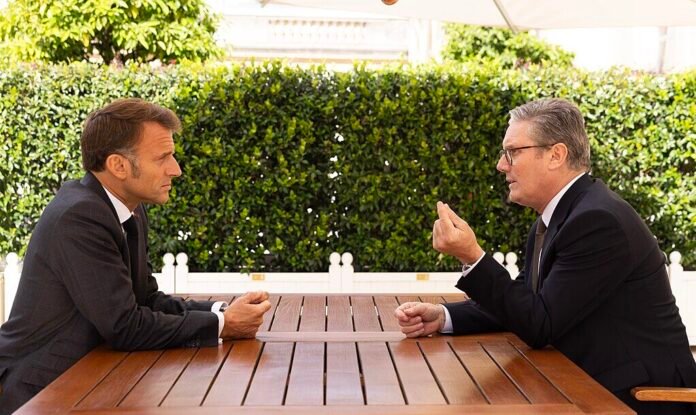Starmer’s new migrant return deal sparks backlash as Macron slams Brexit and crossings explode
Emmanuel Macron has launched a blistering attack on Brexit, claiming it’s at the root of the UK’s spiralling migrant crisis. Speaking alongside Prime Minister Sir Keir Starmer in London, the French president accused British leaders of having “sold a lie” to their people in 2016, arguing that quitting the EU only worsened illegal immigration.
His comments came as the pair unveiled a controversial “one in, one out” scheme meant to curb Channel crossings by returning migrants to France in exchange for a similar number of asylum seekers arriving legally in Britain.
But the plan is already facing fierce legal headwinds and widespread scepticism. Critics say it barely scratches the surface. With up to 600 migrants crossing in small boats in a single day, and more than 21,000 arrivals in the first half of the year alone—a 50% jump from 2024—many question whether returning 50 people a week can truly deter people smugglers.
“The UK has no migratory deal with the EU,” Macron said. “This creates an incentive to make the crossing—the precise opposite of what Brexit had promised.”
The president, who once worked with British authorities to shut down road and rail crossings before Brexit, noted those methods had been effective. Since then, however, boat crossings have surged—from fewer than 2,000 in 2019 to nearly 46,000 in 2022. And now, 2025 is on track to be the worst year yet.
Starmer, for his part, defended the new agreement as a “pilot” that would break the smugglers’ business model. “If successful, the numbers will ramp up,” he said, promising quicker removals for migrants deemed inadmissible because they entered the UK from a safe country.
Under the scheme, selected arrivals will be detained and returned to France, while others with strong UK family links or high asylum success rates—such as Eritreans, Afghans, and Iranians—can apply for refuge in Britain through an online platform.
But even this limited action is facing multiple barriers. Human rights laws, including the European Convention on Human Rights (ECHR), allow many migrants to appeal against deportation. Claims based on family life or persecution could block removals, and past cases show how such appeals can succeed.
Embed from Getty ImagesFurthermore, migrants sent back to France will not be detained by French authorities. That opens the door to repeated crossing attempts. The Home Office says it will track them with biometric data, but resources remain thin. Current UK detention capacity only covers about 2,200 individuals, though officials plan to add 1,000 more spaces.
Meanwhile, French police have begun testing more aggressive tactics at sea—like slashing dinghy rubber or dropping nets from jet skis to disable engines—but a new maritime protocol allowing fuller sea interceptions remains unfinalised.
Starmer also appeared to mock Reform UK leader Nigel Farage during the summit, noting that while his government was striking deals, “others were simply taking pictures of the problem.” Farage, on a boat in the Channel that day, had earlier attacked Macron as “arrogant” and the agreement as a “humiliation for Brexit Britain.”
Back home, the Conservatives slammed Starmer’s handling of the crisis. Shadow Home Secretary Chris Philp branded the returns plan a gimmick, saying Labour had made matters worse by scrapping the Rwanda deportation scheme and repealing key migration laws.
“Returning 50 migrants a week tackles just 6% of arrivals,” Philp said. “Labour promised to smash the gangs. Instead, they’ve handed them a green light.”
The Channel crisis now looms as a defining test for Starmer’s new government—one mired in legal uncertainty, diplomatic tension, and soaring public concern.
